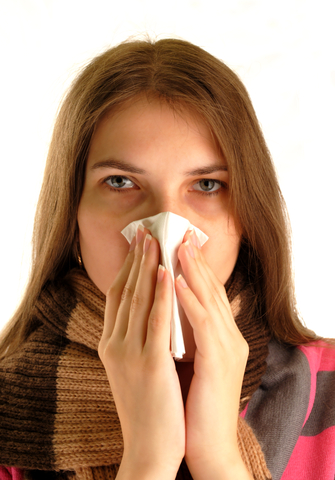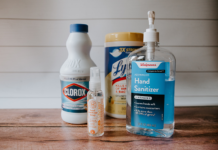by Dr. Craig A. Maxwell
Do you come down with lots of cold, flu, and sinus infections? It could be because you’re exposed to the germ hot spots teeming and flowing with bacteria and pathogens. You can catch a cold from a ketchup bottle or come down with the stomach bug from a hotel TV remote. That’s why you should protect yourself from these germs with these effective tips.
Top 10 Public Germ Hot Spots to Avoid
1. Condiment Dispensers
When you go out to a restaurant, you probably don’t think twice about the possibility of picking up a cold from a ketchup bottle, but condiment dispensers can be some pretty germy things. While bus boys might wipe down tables and refill napkin dispensers, condiment dispensers are very rarely cleaned, if ever. This means if that last person who used it had a cold complete with sneezing, hacking, and coughing, his germs may end up on your plate of French fries. The next time you go out to eat at a restaurant, take some organic, alcohol-based cleansing wipes with you and clean off the condiment bottles before using them.
2. Lemon Wedges
There was a reason I advise avoiding lemons on your restaurant outings. Tests have shown that restaurant lemons contain a disturbing amount of contaminants including fecal bacteria and pesticides. The best way to avoid these contaminants is to ask for your glass of iced water without the garnish.
3. Soap Dispensers
When cleaning staff tends to public bathrooms, they are careful to sterilize the toilets, wash down the counter tops, and empty the trash. Unfortunately, they hardly ever think to clean the one thing patrons likely use the most; the soap dispenser. Soap dispensers are the first thing used after patrons use the facilities so they can often be the most germy of surfaces.
To avoid potential germ contamination, pump as much of the soap as you’re going to use once, wash your hands for 15-20 seconds with hot water, then turn off the tap with the outside of your hand if you’re able.
4. Doctor’s Offices
As someone who has been in the healthcare industry for over 30 years, I can tell you that doctor’s offices are probably one of the most germy places you can visit. Hospitals as well. Since the sickest people are the ones who visit doctor’s offices and hospitals the most, it’s important to take steps to protect yourself and avoid getting sicker than you are or catching something if you’re visiting or helping a relative or friend. Leave at least two chairs between you and the next person when in the waiting room and bring your own tissues and Triclosan-free hand sanitizer.
5. Door Handles
Heading out each day means encountering a wide variety of door handles that could potentially be crawling with cold and flu germs. This goes double for bathroom door handles. After you’ve used the bathroom, take a paper towel and open the door that way. If you’re unable to do that, use a safe, Triclosan-free hand sanitizer periodically throughout the day to reduce your risk of infection.
6. Grocery Carts
Hundreds of people use grocery store carts each day and that’s how germs are easily passed around. Avoid contamination from grocery carts by wiping them off with alcohol-based wipes before use. Alternatively, you can purchase a grocery handle cover to use when you’re out shopping.
7. Travel Bathrooms
If you travel a lot, a trip to the bathroom might have you laid up in bed a few days later. Bathrooms on buses, trains, and airplanes are often not cleaned as often as other public restrooms. Due to this, it’s important to be mindful of avoiding harmful contaminants. You might want to bring your own tissue and soap, “hover” over the toilet instead of sitting, and use a paper towel to open the door when you leave.
8. Public Water Fountains
Let’s face it, nobody wants to pay $3-$5 for a small bottle of water on the go so a drinking fountain might seem like an inexpensive alternative. Perhaps, but unlike public bathrooms, public drinking fountains are hardly ever cleaned. And a lot of people (I honestly can’t understand why) don’t just drink from the stream but wrap their mouths around the fountain itself to take a drink!
Instead of choosing between bottled waters, which often contains pesticides, fluoride, and other harmful chemicals, travel with your own BPA-free water bottle.
9. Hotel Remotes
As I’d written about earlier in a previous article, hotels are pretty germy places all around. Hotel remote controls are often not cleaned the way other common surfaces do. You can reduce your risk of picking up germs by cleaning the remote with a natural hand sanitizer or wrapping the remote in a plastic bag before using it. The sensor will still be able to respond to your commands and while you stay safe and healthy.
10. Hotel Ice Buckets
Hotel ice buckets are another germ hot-spot that is best to avoid. The next time you stay at a hotel, ask for a bag of ice in favor of a bucket. It’s better for your health.
Keep Your Immune System Strong No Matter Where You Are
Avoiding contaminants is one way to protect yourself from being laid up in bed with an illness. However, being too clean isn’t good for your health either. Completely avoiding all sources of germs can actually deplete your immune system’s ability to protect you.
That’s why it’s important to boost your immune system from the inside out by following these tips:
1. Invest in Your Health Through Diet
If you’re not eating a healthy diet, your immune system will inevitably suffer. This is why it’s so vital to wean off highly-processed foods and invest in whole-food fare. For my patients, I recommend a diet rich in organic vegetables, fruits, nuts, seeds, beans, legumes, meat, poultry, fish, coconut oil, olive oil, and avocado. These foods provide your body with the nutrients it needs to keep your immune system strong and prevent disease.
2. Get Plenty of Rest and Relaxation
Rest and relaxation is essential to your cellular recovery, which directly relates to how strong your immune system is. Be sure to get plenty of sleep each night (most adults need 7-9 hours to function at their best) and make time for hobbies you can enjoy and get lost in.
3. Exercise Regularly
Studies have shown that a sedentary lifestyle can greatly increase your risk of developing chronic illness. Regular exercise boosts your T-cells so you can effectively fight off bacteria and pathogens.
4. Take the Right Supplements
Even if you eat a very healthy diet, you may still have nutritional gaps that need to be addressed. Our soil quality is so greatly depleted now that even organic food can’t always fit the bill. Furthermore, poor digestion is fast becoming an epidemic due to chronic use of NSAID pain relievers, poor diet, and excessive antibiotic use.
That’s why I recommend adding an ultra high-quality vitamin supplement. Diamond Nutritional’s Foundation’s Vitamin Formula contains easy-to-absorb vitamins and minerals. I also strongly recommend a high-quality probiotic supplement to improve digestion and make nutrient absorption from food easier.
The more you invest in building your immune system, the better overall health you’ll enjoy.








